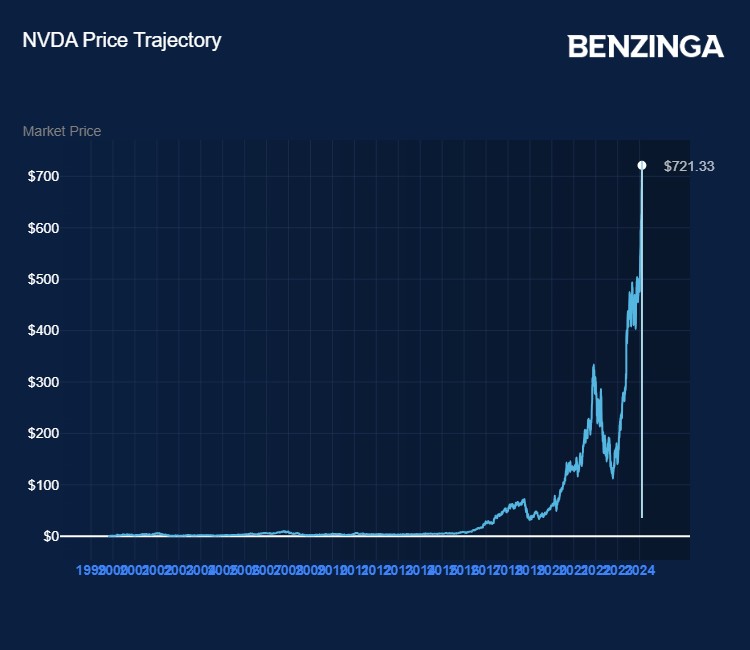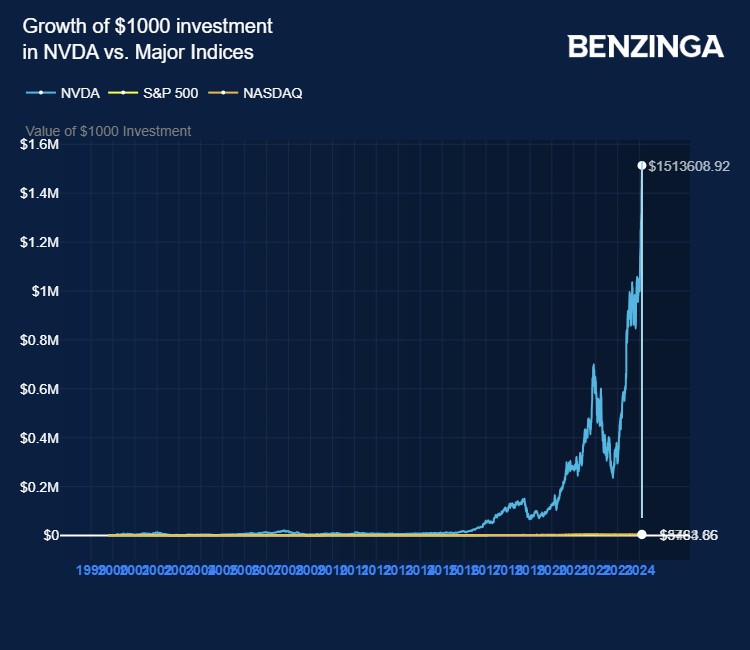Zinger Key Points
- Nvidia launched the world’s “first official GPU,” the GeForce 256, 25 years ago, shortly after going public.
- If you had invested $1,000 in Nvidia stock when it launched the world’s first official GPU 25 years ago, here’s how much you would have now.
- Don't face extreme market conditions unprepared. Get the professional edge with Benzinga Pro's exclusive alerts, news advantage, and volatility tools at 60% (discount ends Wednesday!)
Nvidia Corp. NVDA is one of the hottest stocks of 2024, surging by nearly 50% in the first six weeks of 2024 already. Fueled by the growing buzz around artificial intelligence (AI), Nvidia is closing in on Amazon.com Inc. and Alphabet Inc.'s Google in terms of market capitalization.
Nvidia's graphics processing units (GPU) have been found to be used across different segments. A business that initially catered to gamers with its GPUs subsequently became a favorite amongst cryptocurrency miners for several years before the rise of AI and the development of large-language models.
Nvidia's GPUs are also used in data centers, automotive, and other industries, making them the cornerstone of modern technology development.
Here's Where It Began
One of Nvidia’s groundbreaking contributions to the semiconductor industry was the introduction of the GeForce 256, the world’s first official GPU. Launched in October 1999, the GeForce 256 represented a significant leap forward in graphics processing capabilities.
With its transformative hardware-based transformation and lighting engine, the GeForce 256 delivered unprecedented levels of realism and performance in 3D graphics rendering.
Popular games of the time that supported the GeForce 256 included classics such as Quake III Arena, Half-Life, Unreal Tournament, and Tomb Raider: The Last Revelation.
Jensen Huang, the company's CEO, founded it in 1993 and took it public six years later. While he's leading Nvidia's AI ambitions, he is also the 21st richest person in the world. His wealth also mirrors the surge in Nvidia's stock – both have surged by nearly 50% in 2024 so far.
According to Bloomberg Billionaires Index, Huang's share in Nvidia has skyrocketed his wealth to $63.8 billion.
The surge in AI adoption and development led Huang to share his excitement. "Everybody in the world is now a programmer — that is the miracle."
Now, let's look at how Nvidia stock has fared since its first GPU launch 25 years ago.

Nvidia shares were trading at $0.476563 on Oct. 11, 1999, adjusted for stock splits and other corporate actions.
Its stock price today is $721.33, which is an increase of 151,261% during this period.

If you had invested $1,000 in Nvidia stock on Oct. 11, 1999, today, you would have $1,513,609.
Likewise, if you had invested $1,000 in an index fund replicating Nasdaq, you would have $5,484.
A similar $1,000 investment in an index fund replicating the S&P 500 would be worth $3,765.
Fueling A Million-Fold Surge In Computing Power
From helping the scientific community speed up research to powering the modern-day generative AI hype, Huang's Nvidia has been at the forefront of a million-fold surge in computing power over the past decade.
"One of the greatest contributions we made was advancing computing and AI by 1 million times in the last 10 years," Huang said during an interaction at the World Governments Summit in Dubai.
Huang has predicted that the total investment in data centers around the world will double from the existing $1 trillion to $2 trillion by 2029.
"All of these data centers will be ‘accelerated’. This architecture for ‘Accelerated Computing’ is ideal for this next-generation of software called Generative AI, so that’s really at the core of what’s happening."
He also advocated for nations to develop "Sovereign AI," or "SAI" to make sure their data and intelligence is owned by them.
Huang explained SAI "codifies your culture, your society’s intelligence, your common sense, your history – you own your own data."
"You cannot allow that to be done by other people."
Check out more of Benzinga's Consumer Tech coverage by following this link.
Photo courtesy: Raysonho via Wikimedia
Edge Rankings
Price Trend
© 2025 Benzinga.com. Benzinga does not provide investment advice. All rights reserved.
Trade confidently with insights and alerts from analyst ratings, free reports and breaking news that affects the stocks you care about.